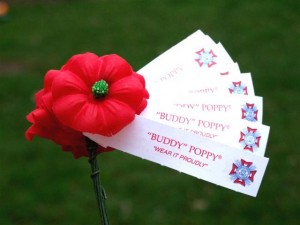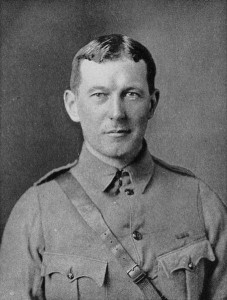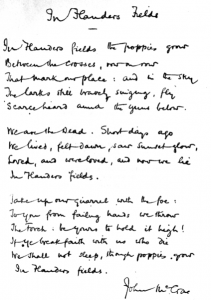VETERAN’S DAY / REMEMBRANCE DAY
Thank You All Veterans!
It is Veteran’s Day in the United States (most other countries call it Remembrance Day or Armistice Day or Poppy Day). Prior to the Korean War, the United States called this day Armistice Day). Ceremonies are held worldwide at the 11 hour, on the 11th day of the 11th month (11 Nov) for all Veterans, dead and alive. This time, 11am / 11th day / 11 month, marked the date and time hostilities ended the First World War. Below is the Poem by Canadian physician Lieutenant Colonel John McCrae that made the Poppy Flower famous.
In Flanders Fields
In Flanders fields the poppies blow
Between the crosses, row on row,
That mark our place; and in the sky
The larks, still bravely singing, fly
Scarce heard amid the guns below.
We are the Dead. Short days ago
We lived, felt dawn, saw sunset glow,
Loved and were loved, and now we lie
In Flanders fields.
Take up our quarrel with the foe:
To you from failing hands we throw
The torch; be yours to hold it high.
If ye break faith with us who die
We shall not sleep, though poppies grow
In Flanders fields.
Later on a second poem referencing to “Poppy Red” was inspired by “In Flanders Fields”. Titled “We Shall Keep the Faith” is a poem penned by Moina Michael in November 1918. She received inspiration for this poem from “In Flanders Fields”. The “poppy red” refers to Papaver rhoeas (the scientific name of the Poppy Red). Ironically, Moina Michael was also instrumental in wearing the Poppy Red as a symbol to remember the Veterans who died during the First World War and is the symbol used today for the dead of all wars (see below).
We Shall Keep the Faith by Moina Michael
Oh! you who sleep in Flanders Fields,
Sleep sweet – to rise anew!
We caught the torch you threw
And holding high, we keep the Faith
With All who died.
We cherish, too, the poppy red
That grows on fields where valor led;
It seems to signal to the skies
That blood of heroes never dies,
But lends a lustre to the red
Of the flower that blooms above the dead
In Flanders Fields.
And now the Torch and Poppy Red
We wear in honor of our dead.
Fear not that ye have died for naught;
We’ll teach the lesson that ye wrought
In Flanders Fields.
In Flanders Fields we fought
| History of Wearing the Poppy to Honor VeteransLike many, today I had a chance to wear my Poppy Flower. I remember seeing these fake Red Poppies every year on my Dad, a Second World War veteran and many of them were around the house throughout the years. Only after I went to my European tour with NATO, did I had a chance to visit the battlefields of First World War and cemeteries in Ypres, Belgium, back in 2005.
Now the red poppies that McCrae referred to had been associated with war since the Napoleonic Wars when a writer of that time first noted how the poppies grew over the graves of soldiers. The damage done to the landscape in Flanders during the battle greatly increased the lime content in the soil, leaving the poppy as one of the few plants able to grow in the region.
Inspired by “In Flanders Fields”, American professor Moina Michael resolved at the war’s conclusion in 1918 to wear a red poppy year-round to honour the soldiers who died in the war. Additionally, she wrote a poem in response called “We Shall Keep the Faith”. She distributed silk poppies to her peers and campaigned to have it adopted as an official symbol of remembrance by the American Legion. Madame E. Guérin attended the 1920 convention where the Legion supported Michael’s proposal and was herself inspired to sell poppies in her native France to raise money for the war’s orphans. In 1921, Guérin sent poppy sellers to London ahead of Armistice Day, attracting the attention of Field Marshall Douglas Haig. A co-founder of The Royal British Legion, Haig supported and encouraged the sale. The practice quickly spread throughout the British Empire. The wearing of poppies in the days leading up toRemembrance Day remains popular in many areas of the Commonwealth of Nations, particularly Great Britain, Canada, and South Africa, and in the days leading up to ANZAC Day in Australia and New Zealand.
|
“In Flanders Fields” is a war poem in the form of a rondeau, written during the First World War by Canadian physician and Lieutenant Colonel John McCrae. He was inspired to write it on May 3, 1915, after presiding over the funeral of friend and fellow soldier Alexis Helmer, who died in the Second Battle of Ypres. According to legend, fellow soldiers retrieved the poem after McCrae, initially unsatisfied with his work, discarded it.
|
Lieutenant Colonel John McCrae |
John McCrae was a poet and physician from Guelph, Ontario. He developed an interest in poetry at a young age and wrote throughout his life. His earliest works were published in the mid-1890s in Canadian magazines and newspapers. McCrae’s poetry often focused on death and the peace that followed.
At the age of 41, McCrae enrolled with the Canadian Expeditionary Force following the outbreak of the First World War. He had the option of joining the medical corps due to his training and age, but volunteered instead to join a fighting unit as a gunner and medical officer. It was his second tour of duty in the Canadian military. He previously fought with a volunteer force in the Second Boer War. He considered himself a soldier first; his father was a military leader in Guelph and McCrae grew up believing in the duty of fighting for his country and empire.
McCrae fought in the second battle of Ypres in the Flanders region of Belgium where the German army launched one of the first chemical attacks in the history of war. They attacked the Canadian position with chlorine gas on April 22, 1915, but were unable to break through the Canadian line which held for over two weeks. In a letter written to his mother, McCrae described the battle as a “nightmare”: “For seventeen days and seventeen nights none of us have had our clothes off, nor our boots even, except occasionally. In all that time while I was awake, gunfire and rifle fire never ceased for sixty seconds ….. And behind it all was the constant background of the sights of the dead, the wounded, the maimed, and a terrible anxiety lest the line should give way.” Alexis Helmer, a close friend, was killed during the battle on May 2, 1915. McCrae performed the burial service himself, at which time he noted how poppies quickly grew around the graves of those who died at Ypres. The next day, he composed the poem while sitting in the back of an ambulance.
ORIGINAL HAND WRITTEN POEM OF IN FLANDERS FIELDS
Thank you to all the Veterans who gave their lives! I will not forget.
NOTE: Some information and images were drawn from the wikipedia.





